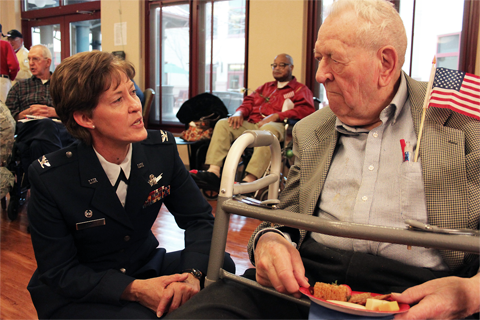Abuse Recovery
A Veterans’ Issue: Deficiencies in CLCs
Guest Blogger: Amber Paley
Veteran Community Living Centers (CLCs) were established by the U.S. Department of Veteran’s Affairs (VA) in order to, “[restore veterans] to maximum function and independence, prevent declines in health, and provide comfort at the end of life” (VA). Unfortunately, some of these centers are guilty of deficiencies in patient/resident care. These deficiencies can put veterans’ lives and health at risk. What makes this issue especially atrocious is that many veterans are vulnerable due to past injuries suffered, such as missing limbs, Post-Traumatic Stress Disorder, paranoia, etc.

Image @ Veterans Affairs
In response to several VA CLCs being reported for abuses in the early 2000’s, the VA contracted the Long Term Care Institute (LTCI), a non-profit organization, in 2007 to investigate. The LTCI thus conducted investigations of 116 of the 132 VA CLCs. The investigations uncovered the following deficiencies:
|
Deficiency Category |
Percentage of CLCs with Related Deficiencies |
Examples of Deficiencies |
|
Dignity |
90% |
Lack of privacy |
| Poor hygienic care | ||
|
Medication Management |
78% |
No assessment of patients before medication administration |
| Administration of medicine without regard for policy and safety procedures | ||
|
Infection Control |
59% |
Measures were not taken by staff to prevent infection from spreading between infected patients and non-infected patients. |
| Staff did not adhere to hand washing policies and procedures. | ||
|
Psychotropic Medications |
47% |
Illegal use of psychological medications (no physician approval). |
| Psychological medications used as restraints | ||
| No records were kept on patient behavior to ensure that use of these medications were necessary. | ||
|
Percutaneous Endoscopic Gastrostomy Tubes |
30% |
Residents experiencing significant weight loss were not assessed by physicians. |
| Staff did not ensure that full doses of medications were administered. | ||
|
Restraints |
28% |
Illegal use of physical restraints |
|
Pressure Ulcers |
24% |
Patients suffering from bed sores went untreated. |
| Irregular checking of patients for having, or being at risk for, pressure ulcers | ||
|
Peripherally Inserted Central Catheter Lines |
21% |
Improperly prepared lines |
| Insufficient dressing changes |
The majority of the deficiencies stated above are very serious. For instance, under the “Medication Management” category, patients who require insulin did not undergo blood sugar tests to assess their blood sugar levels before they were given their insulin. The repercussions of something like that could be devastating to an elderly person’s health.
At the conclusion of the initial investigation in 2008, the VA asked the LTCI to conduct further investigations. After reviewing all of the LTCI’s investigations in October of 2011, the Director of Health Care at the U.S. General Accountability Office suggested that the following actions be taken by the Committee of Veterans Affairs:
- “For reviews conducted by LTCI under the current contract and any similar future contracts, (1) clearly and completely document the feedback provided to CLCs about their corrective action plans, (2) require VA networks to provide periodic reports on the status of CLCs’ implementation of their corrective action plans, and (3) develop and implement a process for verifying any information reported directly to VA headquarters by CLCs.
- Develop and implement a process to comprehensively identify, estimate, and mitigate risks in CLCs by analyzing and comparing all available information regarding the quality of care and quality of life in CLCs.”
According to the report, the VA Committee concurred with the recommendations.
On their own, the deficiencies are truly horrifying. To make the matter even more disturbing is that these men and women suffering from abuse and neglect served to protect the very people mistreating them.
About the Author
Amber Paley is a guest blogger and article writer bringing to us information on deficiencies in VA Community Living Centers.
Additionally, Amber writes about nursing home abuse.



